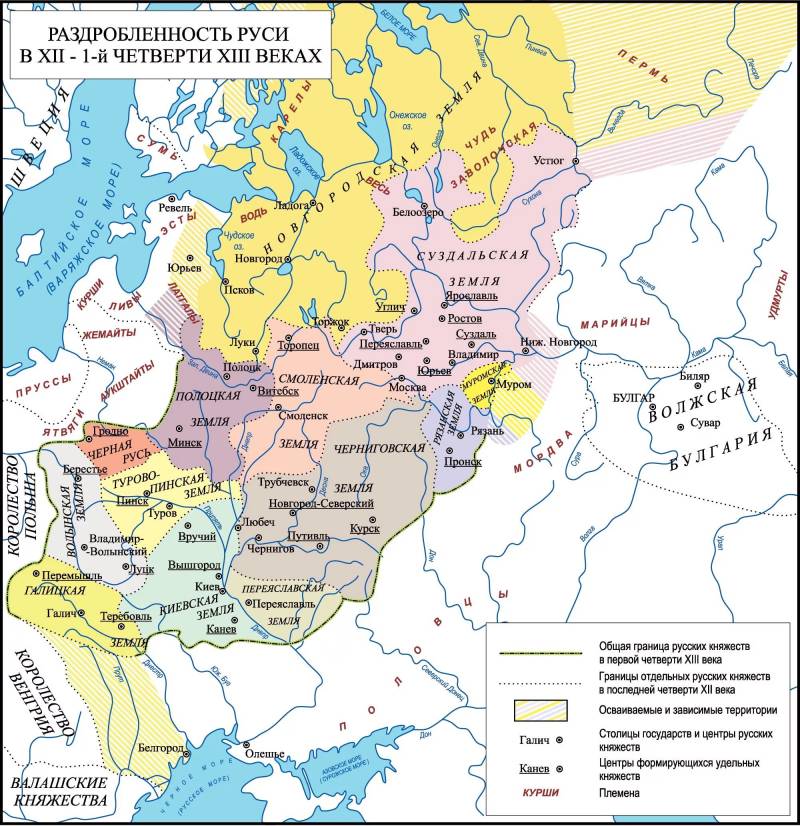On the unity of the Russian world on the example of the grandchildren of Mstislav Udatny
Unfortunately, in the course of numerous discussions about the unity of the Russian world, I have never heard of the fact given below, namely: Prince of Novgorod and Vladimir-Suzdal Alexander Yaroslavich Nevsky and Prince of Galicia and Volyn Lev Danilovich (the one whose name the city of Lviv is named after) - cousins: their grandfather, Prince of Novgorod and Galicia Mstislav Udatny, - the father of their mothers, Theodosius Mstislavna and Anna Mstislavna, respectively. I called Alexander Yaroslavich the first because he was born in 1220, and Lev Danilovich - in 1228. It is interesting to note that Alexander Nevsky from 1248 was the last titled Grand Duke of Kiev, but he himself never visited Kiev and was not involved in Kiev affairs.
To identify family and hereditary relationships, it is advisable to trace the genealogy of Mstislav Udatny and his famous grandchildren a little deeper. Mstislav Udatny himself on the paternal side:
- the son of Mstislav Rostislavich the Brave, Prince of Smolensk and Novgorod; grandson of Rostislav Mstislavich, prince of Smolensk, Novgorod and Kiev;
- the great-grandson of Mstislav Vladimirovich the Great, Prince of Novgorod, Rostov and Kiev;
- great-great-grandson of Vladimir Vsevolodovich Monomakh, prince of Smolensk, Chernihiv, Pereyaslavsky and Kiev;
- great-great-great-grandson of Vsevolod Yaroslavich, prince of Pereyaslavsky, Chernihiv and Kiev;
- great-great-great-great-grandson of Yaroslav Vladimirovich the Wise, the last ruler of a unified Kievan Rus.
Mother of Mstislav Udatny, Theodosius Glebovna:
- daughter of Gleb Rostislavich, Prince of Ryazan;
- the granddaughter of Rostislav Yaroslavich, prince of Pronsk, Ryazan and Murom;
- great-granddaughter of Yaroslav Svyatoslavich, prince of Murom and Chernigov;
- great-great-granddaughter of Prince Svyatoslav Yaroslavich, Prince of Volyn, Chernihiv and Kiev;
- great-great-great-granddaughter of the aforementioned Yaroslav the Wise.
Mstislav married the baptized daughter of the Polovtsian khan Maria Kotyanovna. Thus, Alexander Nevsky and Lev Galitsky for a quarter were Polovtsy.
Alexander Nevsky on the paternal side:
- the son of Yaroslav Vsevolodovich, Prince of Pereyaslavl, Pereyaslavl-Zalessky, Novgorod, Kiev and Vladimir-Suzdal;
- the grandson of Vsevolod Yuryevich the Big Nest, Prince of Kiev, Pereyaslavl-Zalessky and Vladimir-Suzdal;
- great-grandson of Yuri Vladimirovich Dolgoruky, Prince of Rostov-Suzdal and Kiev;
- great-great-grandson of the aforementioned Vladimir Monomakh.
Leo Galitsky on the paternal side:
- the son of Daniel Romanovich, prince of Galicia, Volyn and Kiev;
- the grandson of Roman Mstislavich, prince of Novgorod, Volyn, Galician and Kiev;
- the great-grandson of Mstislav Izyaslavich, prince of Pereyaslavsky, Volyn and Kiev;
- great-great-grandson of Izyaslav Mstislavich, prince of Kursk, Polotsk and Pereyaslav;
- great-great-great-grandson of the aforementioned Mstislav the Great;
- great-great-great-great-grandson of the aforementioned Vladimir Monomakh.
Thus, Alexander and Leo are cousins of their mothers, and of their fathers they are cousins of their grandfather and grandson, respectively.
From Alexander Nevsky come the princes of the Principality of Moscow.
From Leo of Galicia come the single princes of the Galicia-Volyn principality, who ruled until 1325, when they were first replaced by the Polish Piast dynasty, and from 1340 - the Lithuanian Gediminovich dynasty. The principality itself ceased to exist in 1392 as a result of its division between Poland (Galicia) and Lithuania (Volhynia). In 1452, Volyn was also incorporated into Poland.

Information